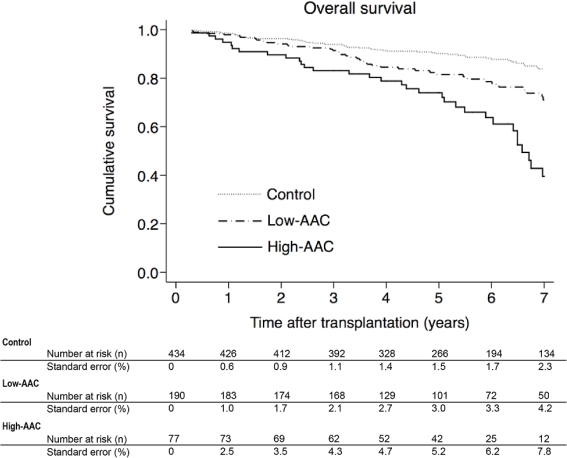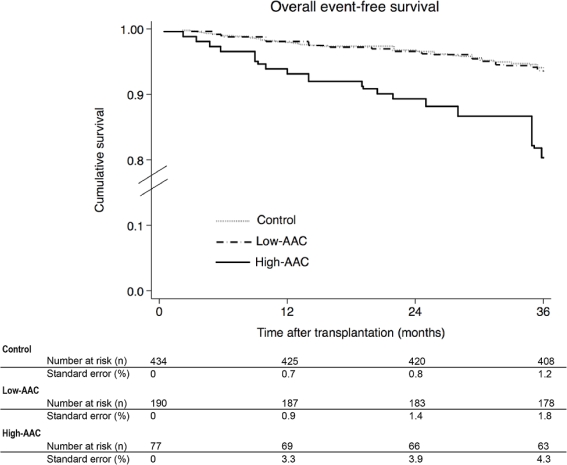A High Abdominal Aortic Calcification Score by Dual X-Ray Absorptiometry (DXA) is Associated with Cardiovascular Events after Kidney Transplantation
1Surgery, University Medical Center Groningen, Groningen, Netherlands
2Medical Imaging Center, UMCG, Groningen, Netherlands
3Nephrology, UMCG, Groningen, Netherlands.
Meeting: 2018 American Transplant Congress
Abstract number: D273
Keywords: Kidney transplantation, Survival, Vascular disease
Session Information
Session Name: Poster Session D: Late Breaking
Session Type: Poster Session
Date: Tuesday, June 5, 2018
Session Time: 6:00pm-7:00pm
 Presentation Time: 6:00pm-7:00pm
Presentation Time: 6:00pm-7:00pm
Location: Hall 4EF
Introduction: It is unknown whether aortic calcification is associated with increased risk for cardiovascular events in renal transplant recipients. Therefore, this study focused on the association of abdominal aortic calcification (AAC) and cardiovascular events, using a dual X-ray absorptiometry (DXA) scoring methodology for AAC.
Methods: From 2008 to 2014, renal transplant recipients referred for a DXA procedure within 6 months after transplantation, were included in a single-center study. Primary endpoint was the occurrence of cardiovascular events, defined as myocardial infarction, cerebrovascular accident or transient ischemic attack, within 3 years after transplantation. AAC was quantified using an 8-score scale system and patients were divided into 3 groups; a control group (AAC = 0), a low-AAC group (AAC = 1 – 3), and a high-AAC group (AAC = 4 – 8).
Results: We evaluated 701 patients, 267 (38.1%) had detectable calcifications (low-AAC 190 patients; high-AAC 77 patients) and 434 (61.9%) had no calcifications. Univariate Cox proportional hazard analysis of the high-AAC score showed a hazard ratio (HR) of 3.3 (95% CI 1.7 – 6.3, p < 0.01) for cardiovascular events, while results were not significant for the low-AAC score, HR 1.0 (95% CI 0.5 – 2.1, p = 0.91). Multivariate analysis showed an independent significant association between a high-AAC score and cardiovascular events, HR 2.4 (95% CI 1.2 – 5.0), p = 0.02).
Conclusions: An independent association between a high-AAC score and cardiovascular events was identified and provides an opportunity for physicians for early cardiovascular risk stratification in renal transplant recipients.
CITATION INFORMATION: Benjamens S., Pol R. A., Glaudemans A. W., Wieringa I., Berger S. P., Bakker S. J., Slart R. H. A High Abdominal Aortic Calcification Score by Dual X-Ray Absorptiometry (DXA) is Associated with Cardiovascular Events after Kidney Transplantation Am J Transplant. 2017;17 (suppl 3).
To cite this abstract in AMA style:
Benjamens S, Pol RA, Glaudemans AW, Wieringa I, Berger SP, Bakker SJ, Slart RH. A High Abdominal Aortic Calcification Score by Dual X-Ray Absorptiometry (DXA) is Associated with Cardiovascular Events after Kidney Transplantation [abstract]. https://atcmeetingabstracts.com/abstract/a-high-abdominal-aortic-calcification-score-by-dual-x-ray-absorptiometry-dxa-is-associated-with-cardiovascular-events-after-kidney-transplantation/. Accessed February 20, 2026.« Back to 2018 American Transplant Congress


